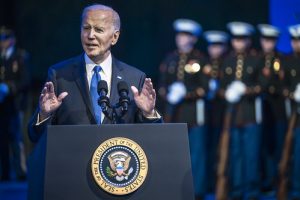Electoral Count Act set to deliver another blow to Trump
The House isn’t the only congressional chamber taking steps this week to counteract former President Trump, as legislation to overhaul how Congress counts electoral votes is one step closer to becoming law.
Less than a day after a House panel investigating Jan. 6, 2021, issued four criminal referrals for the former president, the Senate unveiled a $1.7 trillion omnibus government funding package that includes the Electoral Count Reform Act (ECRA), marking a second blow in as many days against Trump.
The Electoral Count Reform Act, an update to the Electoral Count Act of 1887, raises the threshold for objections to Electoral College votes from one member in each chamber to one-fifth of members in both chambers. Unlike the House panel’s criminal referral that may or may not go anywhere — the Department of Justice is not obligated to consider congressional referrals — the Senate-negotiated bill marks concrete action against Trump that is set to be signed into law by the end of the week.
“It will arguably save our democracy,” Sen. Chris Murphy (D-Conn.), who helped negotiate the proposal, told The Hill. “What we wrote is not foolproof. Malevolent actors could still steal an election, but it makes it a lot harder.”
The effort comes two years after Trump and his allies attempted to use the 135-year-old statute to block the certification of the 2020 presidential election.
In addition to increasing the threshold, the bill clarifies that the role of the vice president in tallying and certifying the Electoral College votes is purely ceremonial and that only a state’s governor or another designated official may submit election results.
And the proposal allows the General Services Administration to release transition funds to both candidates if neither has issued a concession five days after the election. It would, however, nix funds to the losing candidate once the result of the election was determined.
Sens. Susan Collins (R-Maine) and Joe Manchin (D-W.Va.) led negotiations on the measure over the summer. The push ramped up prior to the October recess and included winning support from Senate Majority Leader Charles Schumer (D-N.Y.) and Senate Minority Leader Mitch McConnell (R-Ky.), before it was ultimately included in the year-end package.
Of course, the timing of the Electoral Count Reform Act’s passage and the conclusions laid out by the Jan. 6 select committee are largely coincidental. Both had deadlines of the end of the year to get them across the finish line due to the incoming House GOP majority.
However, it did turn into somewhat of a one-two punch. And passage of the Electoral Count Act reform was considered a priority by top lawmakers.
“I think it’s just important to get that done before it becomes a presidential year issue of some kind and needs to be changed. We’ve got broad agreement on changes,” said Sen. Roy Blunt (Mo.), the top Republican on the Senate Rules Committee, told The Hill. “It will be a good thing.”
“It really was never a problem anywhere from 1887 until 2001. Since it became a problem, it’s become a problem about three or four times. It’s just an important time to straighten it out,” Blunt, who is retiring, continued. “People decided no matter what the law says, they want to read it some other way and clarifying this law is a good thing.”
Republicans received a key boost on Tuesday, when Sen. Rand Paul (R-Ky.) tossed his support behind the proposal. Paul argued in an op-ed in The Louisville Courier-Journal that the electoral system needs to be fixed so that the Electoral College writ large is not abolished.
“This legislation preserves the Founders’ intent that the laws and election results of the several states are respected,” Paul wrote. “Enacting the Electoral Count Reform and Presidential Transition Improvement Act into law will help demonstrate, both to our citizens and to the world, that our republican form of government, which respects the laws of the sovereign states and the various perspectives of individuals throughout our common country, will long endure.”
Blunt noted that perhaps the most important item included is a provision that strikes a nearly 200-year-old law that state legislatures could use to nullify the popular vote by declaring a “failed election,” noting that the term has never been specifically defined.
“[It] may in some ways be the provision that most needed clarifying,” Blunt added.
As of Tuesday afternoon, Trump had not referenced the ECRA effort on his Truth Social page since the beginning of the week. By contrast, he dedicated roughly a dozen posts to the Jan. 6 committee’s criminal referral to the Justice Department.
That panel held its final public meeting on Monday, at which it voted on the four criminal referrals, and plans to release the full report from its 18-month investigation on Wednesday. Formula One drivers ordered to seek permission for ‘political statements’ GOP announces dates for 2024 national convention
The Senate-led package was included at the expense of a stricter House bill drawn up by Reps. Zoe Lofgren (D-Calif.) and Liz Cheney (R-Wyo.), two members of the Jan. 6 committee, that would have required one-third of lawmakers in each chamber to object.
The ECRA blueprint was attached to the omnibus spending bill alongside other items, including funding for Ukraine, a ban on TikTok from being used on government phones and devices, and money for disaster relief.
Among the provisions not included were an expansion of the child tax credit, a bill allowing banks to become involved with legal cannabis businesses and sentencing reform.


